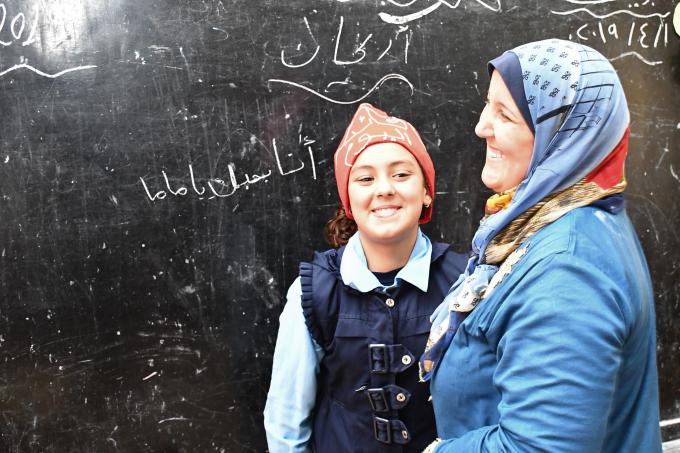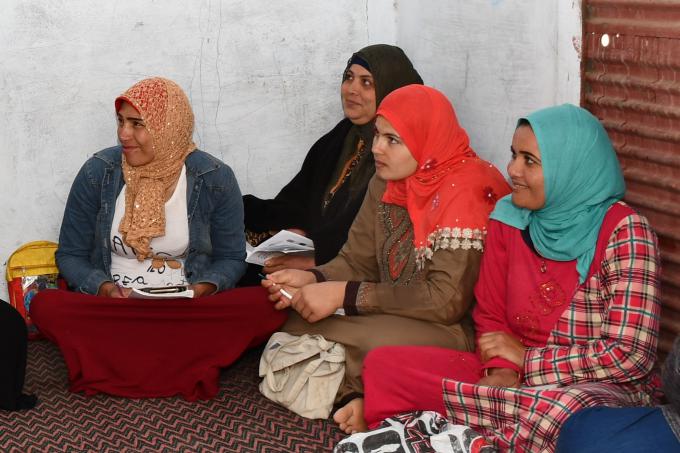International Literacy Day: “There is so much a woman can do, and we are ready.”
El-Heyeebi is an agricultural village in Beheira with humble homes, dirt roads, lack of access to basic commodities and a struggle with illiteracy. Between older children dropping out and younger children lacking a nurturing learning environment outside school, things went from bad to worse. Illiterate generations wanted to change but did not know how.
“My child was in kindergarten; whenever she used to come to me with questions about her homework, I would tell her to stop talking because I do not know what she is talking about,” says Hoda, one of the community residents.
In Egypt Save the Children works extensively on literacy programs with children, youth, and mothers – Egyptians, migrants, and refugees. Our Literate Village (LV), a four-year project funded by USAID, provides a model that breaks the cycle of inter-generational illiteracy in rural Egypt. By providing sustainable and effective learning approaches, LV fosters a culture of reading across communities and generations, and uses literacy and education to strengthen local community and governance structures. The experience of El-Heyeebi demonstrates the power of education to transform lives.
LV triggered a chain reaction, first by improving the village’s community school. Not only has attendance become regular, students now participate in activities that reinforce values and skills like collaboration with classmates, leadership and public speaking.
It was a different struggle for mothers and women. The will to learn was there, but there was no free public space available to hold the project’s literacy class. After gaining the skills and confidence through the LV program for adults, El-Heyeebi women decided to take matters into their own hands. Driven by prospects and supported by other members of the community, they collected money from one another to rent an old shop where they now hold their sessions.
Almost seven months later, most of El-Heyeebi women have steadily attended sessions and can read and write. Some of the women travel from nearby villages every day on foot to join the classes, and now proudly call themselves educated.
“Reading is now a regular practice with my daughter. I even bought her a small board and pen, and bought one for myself too, and we read and write together. Our thoughts and practices became one,” Hoda follows up, after becoming a regular attendee of the literacy class.
“I used to go and ask my son ‘Have you finished your homework?’ and he would say yes when in fact he did not. I could not know. Now that I understand and know better, I ask him about his homework and I even help him when he makes mistakes. He is sad that I am no longer illiterate,” jokingly exclaims Iman, another attendee.
In addition to supporting their families’ education, women understand the connection between their literacy and raising healthy and safe families. “We learned in the story of the influential writer Taha Hussein – that he went blind because of his mother’s ignorance. What if we had done this with one of our children?” says Doaa, a mother of two and a leading woman in the class.
Things are very different now in El-Heyeebi village. The community came together with LV to support women and children in becoming improved, motivated learners. The village received its first book bank, and members are eager to begin expanding their knowledge and skills. LV also continues to motivate learners and communities by teaching women necessary life and leadership skills, so that they take can take charge of shaping and planning their next steps. When asked how she sees the future, Doaa followed up, “we want to start learning crafts and create small businesses to help support our families. There is so much a woman can do with the proper tools, and we are ready.”
Save the Children advocates for a literate world by empowering educators, providing a quality learning environment for students, and encouraging leaders with the resources they need to make literacy accessible for all people.
International Literacy Day 2019 will focus on ‘Literacy and Multilingualism.’ Despite progress made, literacy challenges still persist, distributed unevenly across countries and populations. Embracing linguistic diversity in education and literacy development is central to addressing these literacy challenges and to achieving the Sustainable Development Goals.
 Egypt
Egypt 
